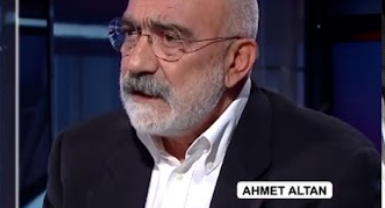Photo: YouTube
Political prisoner and author of the transcendent prison memoir I Will Never See the World Again, Ahmet Altan was freed in the Summer of 2021. Altan’s imprisonment was objected to by an wide contingent of world-leading writers and artists. Thirty-eight Nobel laureates—including Svetlana Alexievich, JM Coetzee, Kazuo Ishiguro, VS Naipaul, Mario Vargas Llosa—penned an open letter to the president of Turkey demanding Altan’s release.
We are now near the publication of his new poignant coming-of-age novel, penned from his prison cell, LADY LIFE (Other Press Trade Paperback Original; On-sale: 3/14/23).
As author of Even So, Lauren B. Davis noted, “Ahmet Altan perfectly braids the personal and the political, the erotic and the intellectual, the hilarious and the tragic, reminding us there is very little difference between the strands. Lady Life is a gift to readers.” LADY LIFE, which Altan created employing the sheer magic of his imagination as a tool for survival in his prison cell, lends moments of remarkable humor in a present-day Istanbul rife with economic and political hardships.
Fazıl’s comfortable existence studying literature is upended by his family’s sudden financial ruin, followed swiftly by the death of his father. Forced to sell his belongings and move to an old boardinghouse, he discovers a new side of the city, populated by immigrants, poets, sex workers, and busboys, all struggling to get by.
On a tip from a fellow resident, Fazıl finds work to support himself through university, as an extra on a TV show, where he meets two women who will change his life. Sıla, a striking young student, shares his love of Virginia Woolf and uniquely understands his current predicament: once well-off, she too has lost everything, after the government unjustly seized her father’s business. While they begin a tentative romance, Fazıl is also drawn to the show’s vivacious leading lady, Hayat, whose carefree, sensuous outlook differs so greatly from his own.
LADY LIFE offers a witty, insightful view of modern Turkey and shows how we can find light in the darkest times.
PRAISE FOR LADY LIFE:
“A studied look at the alienation that springs from oppression…a moving meditation on love, loneliness, and literature.”
—Omar Sakr, author of Son of Sin
“As surely as dissidents have been locked up throughout Turkey’s turbulent modern history, their words — poems, memoirs, fiction and even screenplays — have managed to break out….One, a jailhouse diary by the novelist Ahmet Altan, has a title that evokes the hopeless length of his sentence: “I Will Never See the World Again.”…. He is serving a life sentence without the possibility of parole after being convicted of “trying to overthrow the constitutional order.”
—THE WASHINGTON POST
“Remember the name Ahmet Altan! Add him to the great voices writing from prison across the centuries – Boethius, Cervantes, Gramsci, Soyinka, Solzhenitsyn – and be moved to tears and indignation by his story.”
—Ariel Dorfman
“… [A] remarkable, touching memoir — which Altan wrote entirely from his prison cell and snuck out in notes he gave to his lawyers — is a collection of experiences, thoughts, conversations, internal debates…Altan’s talent as a writer allowed him to communicate his experience in rich, haunting detail. Some pages are full of pain, but others are full of hope…Despite the oppressive, cruel darkness at the core of Altan’s memoir, his words shine like bioluminescent creatures patrolling the abyss. His reflections, observations, and indomitable spirit are a testament to human resilience and the power of thought. He is a writer and his words can’t be locked up even if his body can…I Will Never See the World Again walks a fine line between loveliness and horror, hope and pain, devastation and strength. Altan’s prose is sharp and lyrical…”Everything changes on earth, but stupidity and meanness never change.” Recep Tayyip Erdoğan’s regime took away Ahmet Altan’s freedom. He was forced to endure awful living conditions and the pressure of accepting his life had been, to an extent, lost forever. However, that pressure created a diamond that transcends space, language, and politics. I Will Never See the World Again is that diamond. Altan is locked up, but his words are free, and they demand to be read.”
—NPR.org
“Over November 2017 to May 2018, Altan managed to send out handwritten notes from prison to his friend and translator Yasemin Çongar, who immediately transcribed the blue-ink-on-white-sheets to a computer and translated each missive in a single sitting. She transfers that immediacy onto the page with reverence and grace, the essays alchemized into this phenomenally inspiring memoir. Despite stifling, Kafka-esque circumstances, Altan channels freedom through his imagination; he escapes through his mind. His unfailing creativity feeds his very soul to survive: ‘I will write in order to be able to live, to endure, to fight.’”
—BOOKLIST, STARRED REVIEW
“A Turkish political prisoner opposes his imagination to the grim reality of oppression in this sometimes harrowing, sometimes luminous memoir….In these essays, Altan vividly evokes the Kafkaesque farce of court proceedings; prison squalor and claustrophobia; the dehumanizing routines of handcuffs, lineups, and confiscations that “carved us out of life like a rotten, maggot-laced chunk from a pear;” a future of heartbreaking constraint in which “I will never see a sky unframed by the walls of a courtyard.” But he’s also buoyed by small kindnesses, the hope of seeing loved ones, a cellmate who refuses police demands to denounce others, and writerly reveries that let him “pass through your walls with ease.” Intertwining gritty detail with lyrical effusion, Altan’s narrative is a searing indictment of Turkey’s authoritarian regime and an inspiring testament to human resilience.”
—PUBLISHERS WEEKLY, STARRED REVIEW
“I hope that everyone who can read, whatever their politics, reads Ahmet Altan’s response to his imprisonment. Repressive regimes hope that if they lock up writers they are also locking up ideas. This will always fail.”
—Neil Gaiman
“From the bowels of Erdogan’s prison system emerge these meditations on the vicissitudes of justice, products of a richly stocked mind, engrossing, sometimes profound, and remarkable for their equanimity.”
—JM Coetzee







